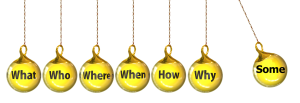In my readings, I’ve noticed many unnecessary occurrences of the word some. I have to ferret out that sneaky word from my drafts. But I don’t delete all of them. Sometimes some is the correct word.
Where the word some works.
Example
> “Did you read all of the book?”
“I read some of it.”
Although some works, it’s a vague word here. If how much of the book read is important to the story, a more specific word is better.
Suppose the person asking is a contest organizer talking to a procrastinating judge. The organizer will want to know how many pages out of the total number of pages the judge has read. The judge would know that’s what the organizer is seeking.
But suppose the person asking is a mother talking to a teen who needs to complete a book report. Some would be appropriate for an evading teen. The next dialogue statement from the mother might be:
“Exactly how many pages have you read?”
Where some doesn’t work well.
Example
> Daryl grabbed his phone and tapped in some numbers.
Some isn’t necessary.
< Daryl grabbed his phone and tapped in numbers.
This is more concise and punchier.
Example
> I wish you’d write some more tips on your blog.
Does the speaker want the blogger to write more tips, or does the speaker wish to limit the number to a few more tips. Probably the former. Some isn’t necessary.
< I wish you’d write more tips on your blog.
Example
> Jerry poked some ruffles on her sleeve.
This sounds like Jerry singled out particular ruffles to poke.
< He poked the ruffles on her sleeve.
Example
< They played some tennis before getting ready for dinner.
Some is unnecessary or, if necessary, is imprecise.
> We played tennis before getting ready for dinner.
> We played two sets of tennis before getting ready for dinner.
Example
> She’d softened her attitude some toward him and given him hope.
Some used for degrees is vague and doesn’t add to the meaning of this sentence. It causes wordiness. The word softened already assumes a degree compared to changed her attitude.
< She’d softened her attitude toward him and given him hope.
Example
> We have some exciting news, girls. You’re going to have a brother.
This sounds like the parents have only a part of the exciting new that they could have. Remove some, and the excitement of the statement rises.
< We have exciting news, girls. You’re going to have a brother.
As in the last example, some becomes a weasel word, sucking the life out of adjacent words. Some sucked the life out of exciting.
Watch for the word some; it can be vague and unnecessary. Click to tweet.
What are other vague, unnecessary words?
 Suddenly unemployed, Allie Masterson returns home to Cary, North Carolina where she caddies for her father on the PGA Seniors Tour. There, she encounters a man who possesses an alluring gift of reading the contours of the green. Fascinated with his uncanny ability, Allie is excited to meet the Green Whisperer—until she discovers that the easygoing caddy is actually Shoo Leonard, the boy who teased her relentlessly when they were kids. Despite Allie’s reservations, when Shoo is faced with having to overcome a hand injury, she agrees to use her sport science degree to become his trainer…and then she falls for him.
Suddenly unemployed, Allie Masterson returns home to Cary, North Carolina where she caddies for her father on the PGA Seniors Tour. There, she encounters a man who possesses an alluring gift of reading the contours of the green. Fascinated with his uncanny ability, Allie is excited to meet the Green Whisperer—until she discovers that the easygoing caddy is actually Shoo Leonard, the boy who teased her relentlessly when they were kids. Despite Allie’s reservations, when Shoo is faced with having to overcome a hand injury, she agrees to use her sport science degree to become his trainer…and then she falls for him.
Shoo Leonard is grateful to Allie for her singular determination to get him ready for the PGA tour, but he isn’t ready for anything more. Still raw from a broken engagement and focused on his career, he’s content to be her fist-bumping buddy…but then he falls for her.
What seems like a happily-ever-after on the horizon takes a turn when Allie decides she’s become a distraction to Shoo’s career. Is it time for her to step away or can The Putting Green Whisperer find the right words to make her stay?





 RSS - Posts
RSS - Posts



That was some blog, Zoe. Thanks so much!
Sheri, my husband laughed then the light bulb went off and I laughed. Thanks for coming by.
Made me want to word search ‘some’. Thanks
Hi Marcia, ever since I posted this I catch myself using “some.” I stop and either delete or change it.
Great post Zoe. Thanks for sharing!
Good luck and God’s blessings
PamT
Thanks for coming by, Pam.